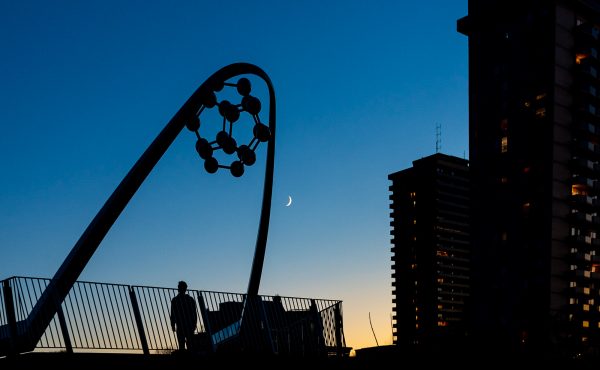“David Miller Transit Mayor” is a new web series that explores the life and leadership of Toronto’s 63rd mayor as explained by Miller himself. Each chapter in this seven-part series, launched on SpacingToronto.ca every Wednesday, explores the issues that defined Miller’s time in office including the economy, creativity, accessibility and of course, transit. You can also read about Miller’s point of view on why Canada needs a national transit strategy in Spacing’s just released national issue. Find a copy of the magazine in local stores and Chapter’s-Indigo outlets across the country.
In Chapter 1, filmed at Spacing’s home at the Center for Social Innovation, Miller shares insights on what led him to politics, what it takes to pursue passion and why Toronto is the global center for innovation. “David Miller Transit Mayor” was a joint initiative by My City Lives and Biz Media.
You can view the first video here.





12 comments
Is this supposed to be funny?
What kind of revisionist history is this? Transit City was not a transportation policy. It was a neighbourhood regeneration project under the assumption that a railway running through the middle of the street magically gentrifies everything around it.
The subway extension was the result of ambitious politicians living north of the city who wanted it extended to them which – fortunately for Miller – necessitated a Toronto expansion as well to break through the 416 borders. It had nothing to do with him. York U students can thank Sorbara for that.
Let’s cut the crap. If he was a real transportation mayor he would have made Transfer City a real LRT network. That means full grade separation, dedicated signal priority with appropriate speed & spacing. Transfer city was the worst of all worlds. Expensive and slow.
Not even that – but he never brought Transit City before council in the first place. It was written on the back of a napkin and in the end it got dismissed in much the same way.
It’s also hard to overlook that in the end it was Miller that gave us Ford which makes the whole thing so tough to take.
Ah, Miller, despite his good intention and that fact that he mostly got the big picture right, he had been an astounding failure. Somebody who alienated his electoral so much that they voted in Ford as a revenge only deserves a failing grade. Instead of looking back at him with fondness, we downtown pinkos better try to figure out what went wrong with him in the next 3.5 years.
So, YU, we were told in the last election that “a vote for Pantalone is a vote for Ford”, and “a vote for Smitherman is a vote for Ford”, and now you’re telling us that “a vote for Miller was a vote for Ford”?
Wasn’t it all Lastman’s fault? If he hadn’t screwed up and told Councillor Miller “You say stupid things”, we wouldn’t have elected Miller, and therefore we wouldn’t have elected Ford?
Huh, it’s turtles all the way down.
It’s Nathan Phillips’ fault.
Everyone blames the previous government for the problems they currently face. Time for people to take a stand and get more involved instead of sitting down arguing about how the last person screwed it up. I thought Miller did a good job with what he was given. The main problem with his government was lack of communication to the areas his projects were going to affect.
If there had been better communication from the start maybe more people would have put up a fight about Transit City.
Have to agree with Yu. Most people who voted for the candidate who is now our mayor probably did not vote for Ford, but rather the anti-Miller. In politics, having the “vision” thing simply isn’t enough, a lesson that still seems to be lost on the many supporters he still seems to have.
Yeah, David Miller didn’t alienate his electorate. He finished his 2nd term with a 60% approval rating, a higher percentage than he ever got in an election.
Rob Ford can be attributed to weak election opponents more than David Miller, I believe. Plus the recession, which often makes people turn inward and vote for politicians who make an individual rather than a collective appeal.
You can’t blame David Miller for Rob Ford.
Rob Ford is why Rob Ford got elected — weak opponents who couldn’t put together a coherent message is another reason.
Saying Ford is Miller’s fault is silly: every poll done leading up to the election said Miller woulda beat Ford if he had been in the race. Its hypothetical, of course.
A strike by a union with its head up its ass is another reason Ford got elected — even with a union-friendly mayor, CUPE et al. decided it was gonna be easy to take on Miller and get what they wanted. They didn’t and caved and the city still got Ford.
But not to worry — we’re only 6 months into Ford’s term and it already looks to be falling apart. It took 6.5 years for Miller to seem vulnerable.
Well, we can all choose to believe what we want to believe, especially on things that cannot be verified, like the myth (what I believe to be) that Miller still enjoyed popular support and would have won the race had he jumped in. After all poll said so, didn’t it? But poll also said, Ford and Smitherman was going to have a neck to neck race. Unfortunately that time it was verified against reality. Here is another thing I chose to believe: after the strike Miller came to realize that he did not stand a chance, so he decided to quit to avoid humiliation.
Monty, I do agree that Miller was the best friend of CUPE and CUPE was the best friend of Ford. However, I think people were not that mad at Miller when the strike started. They actually got behind him and dug in for a prolonged showdown with CUPE. It was when it ended that they became mad at Miller. I am not sure who really caved, but in Torontonians’ view, it was Miller who caved and sold them out to CUPE. Had the strike ended with some major concessions (even just something symbolic major) from CUPE, guess who would be the mayor today: Miller.
A poll that measures how Miller would have fared in the election AFTER he had announced he would not be running is simply not a credible poll. After the strike of 2009, Miller got the message from virtually all his backroom boys that he was un-electable, and that they would not be in his corner. His approval rating after the strike was nowhere near 60%. But of course all this means nothing to those who take great comfort in the “fact” that Miller would have won if he chose to run again because, “hey, all the polls said he would have.” Yeah, ok… I will definitely agree that Ford is not Miller’s “fault”. But Miller’s tenure is a key REASON or explanation for why Ford is mayor. A reason/explanation is not the same as a “fault”.
Some of the commentators above seem to be confusing the concepts of “blame” and “explanation”. Of course it’s not Miller’s “fault” (or that he is to “blame”) that Ford is now mayor. But that doesn’t mean that Miller and his administration are not the the “key factor”, “reason” or “explanation” (or at least a key factor, reason or explanation) as to why someone like Ford is mayor. One can see something or someone as a key factor in why something happened without attributing “fault” or “blame” to them. As for Miller’s support after the 2009 strike, it was nowhere near 60%, which is why most of his backroom support deserted him (and anyone who has any contacts at City Hall will know this). Regarding the poll that showed that he would have been elected Mayor a third term, that was simply not a credible poll since respondents already knew he wasn’t running.
Sorry for last post… previous one didn’t show up on my computer when i keyed it in.